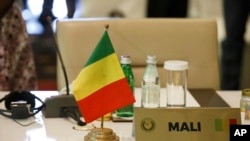For more on talks between ECOWAS and Mali, regarding the release of Ivorian soldiers, VOA’s James Butty spoke with Abdel Fatau Musah, the new ECOWAS Commissioner for Political Affairs and Security.
The interview was edited for brevity and clarity.
VOA: What is the status of talks between Mali and ECOWAS regarding the unconditional release of Ivorian soldiers?
Musah: For some time now there has been some misunderstanding between Cote d’ivoire and Mali over the detention of 49 Ivorian soldiers who Cote d’ivoire officials say were there at the request of MINUSMA, however Malian authorities say the soldiers were mercenaries.
To date, 3 detainees have been released.
Cote d’ivoire insists that the detained soldiers are not mercenaries and Mali should not use this detention to blackmail them.
Among other things, Mali is also repressing the extradition of some Malian citizens in Cote d’ivoire and insist that those citizens are using Cote d’ivoire to destabilize Mali.
The summit of the 22nd of September dealt with this matter and resulted in the decision to dispatch a delegation of heads of state, among them Ghana, Senegal, and Togo to Bamako to continue dialogue which seeks the release of the remaining 46 Ivorian soldiers.
VOA: At the summit on the sidelines of the UN General Assembly, ECOWAS called for the unconditional release. Is that the message you are going to deliver?
Musah: ECOWAS is going to demand the unconditional release of these 46 soldiers.
If they are not going to release them, they (Mali) must provide evidence which will satisfy ECOWAS authorities.
VOA: Does ECOWAS accept Mali’s position which states that this is a judicial and bilateral matter between them and Cote d’ivoire?
Musah: ECOWAS heads of state do not buy that idea, and this is not a judicial matter.
Proof of that is fact that if Malian authorities say they are not going to interfere with judicial matters, why do they ask for a quid pro quo and asking for the extradition of so-called Malian dissidents based in Cote d’ivoire in exchange for the release of the 46 soldiers.
This means that this is not just a judicial matter, and this is a political issue.
VOA: ECOWAS recently passed a decision to impose additional sanctions on Guinea. What can you tell us about that?
Musah: If you recall the last ECOWAS Summit, both Burkina Faso and Guinea were given ultimatums to accept a reasonable timeframe for the restoration of constitutional order or face sanctions.
In the case of Guinea, they were given up to the first of August to propose an acceptable time frame for the transition or sanctions would automatically be imposed.
The first of August passed and to date they are yet to present an acceptable transition timeframe and insist that they are not placing importance on the duration of the transition but are more concerned about the content which will be decided through internal dialogue.
ECOWAS authorities say they demand an acceptable timeframe within which whatever content is discussed, not the other way around.
Guinean authorities are yet to propose an acceptable timetable and insist on six months which is unacceptable to ECOWAS authorities and a large section of the political class and civil society in the country.
